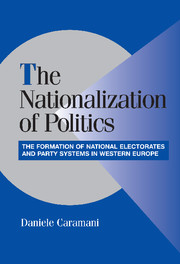 The Nationalization of Politics
The Nationalization of Politics Book contents
- Frontmatter
- Contents
- List of Tables
- List of Figures
- Abbreviations and Symbols
- Preface and Acknowledgments
- INTRODUCTION: HOMOGENEITY AND DIVERSITY IN EUROPE
- Part I Framework
- Part II Evidence
- Part III Toward an Explanation
- CONCLUSION: FROM TERRITORIAL TO FUNCTIONAL POLITICS
- Appendix 1 Party Codes
- Appendix 2 Territorial Units
- Appendix 3 Computations
- Appendix 4 Country Specificities
- Appendix 5 Sources
- References
- Index
- Cambridge Studies in Comparative Politics
- References
References
Published online by Cambridge University Press: 02 December 2009
- Frontmatter
- Contents
- List of Tables
- List of Figures
- Abbreviations and Symbols
- Preface and Acknowledgments
- INTRODUCTION: HOMOGENEITY AND DIVERSITY IN EUROPE
- Part I Framework
- Part II Evidence
- Part III Toward an Explanation
- CONCLUSION: FROM TERRITORIAL TO FUNCTIONAL POLITICS
- Appendix 1 Party Codes
- Appendix 2 Territorial Units
- Appendix 3 Computations
- Appendix 4 Country Specificities
- Appendix 5 Sources
- References
- Index
- Cambridge Studies in Comparative Politics
- References
- Type
- Chapter
- Information
- The Nationalization of PoliticsThe Formation of National Electorates and Party Systems in Western Europe, pp. 323 - 340Publisher: Cambridge University PressPrint publication year: 2004


